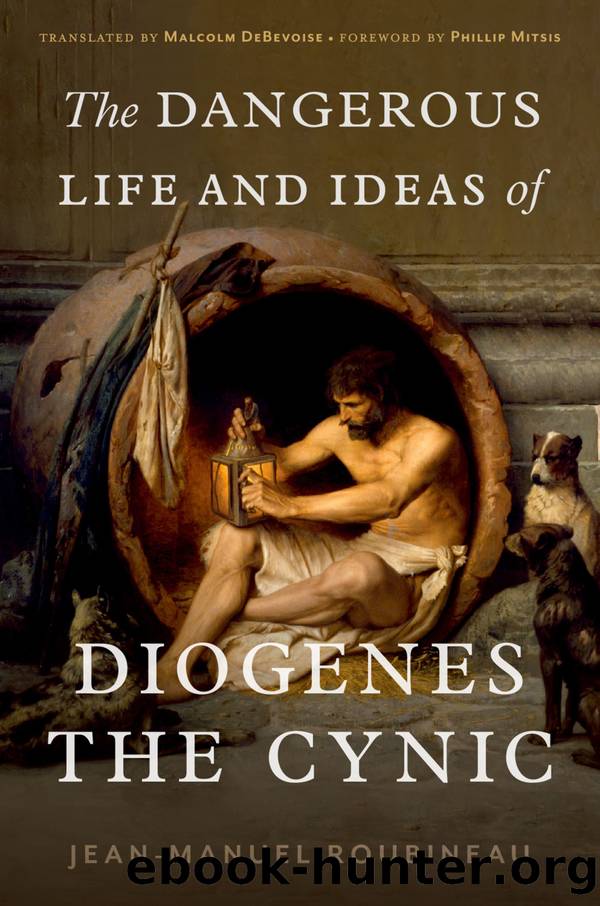The Dangerous Life and Ideas of Diogenes the Cynic by Jean-Manuel Roubineau

Author:Jean-Manuel Roubineau
Language: eng
Format: epub
Publisher: Oxford University Press
Published: 2023-05-15T00:00:00+00:00
Cynic Attitudes Toward Sexuality
We have seen that the body is inseparable from the elaboration of a Cynic philosophy. For ancients no less than moderns, the doctrines and practices of Diogenes and his followers concerning sexuality are the most puzzling aspect of their legacy.
Any study of Cynic views in this connection immediately runs up against the difficulty that it is not always easy to separate the documentary wheat from the chaff. Many ancient authors, whether they were hostile to Cynicism or simply appalled by the behavior of its exponents, distorted or misrepresented the arguments they made. In the case of Diogenes himself, the rough edges of his thought were frequently smoothed out by his defenders, and its most shocking features toned down or expurgated; his detractors, for their part, called attention to these things in order to blacken his reputation as far as possible. Exaggerated and caricatural treatments of Cynicism are common in works by Epicurean and Christian scholars. Philodemus of Gadara, an Epicurean philosopher of the first century BCE, in his commentary on Diogenesâs treatise of political philosophy, the Republic,22 accentuates what he considers to be its most subversive aspects and often presents them in a misleading light. Philodemus claims, for example, that the Cynics reacted violently against anyone who resisted their sexual overtures, contrary to the principle of free consent, a central element of both Cynic and Stoic thought.
A similarly gratuitous reading of Diogenes was popularized by certain Christian authors. The Fathers of the Church were not all of one mind. Whereas some of themâClement of Alexandria, Origen, and Theodoret of Cyrusârecapitulated Cynic doctrine in a reasonably objective manner, others dwelt to the point of absurdity on the justifications Cynics were supposed to have advanced for incest, parricide, cannibalism, and abandoning burial customs, with the result that they were transformed into monsters, made hideous by every vice imaginable.
One thinks in this connection of Theophilus, bishop of Antioch in the second century CE. Only one book from his hand has come down to us, the Apology to Autolycus, in which he seeks to demonstrate the consistency of the Old Testament, contrasting this with what he takes to be the contradictions of the Greek philosophers and, more generally, pagan immorality. The Cynics, he maintained, urged that fathers be cooked and eaten by their children. Other authors extended this type of calumny to the Cynicsâ heirs, the Stoics. Epiphanius, writing in the fourth century CE, claimed that Zeno endorsed cannibalism; at about the same time John Chrysostom claimed that he made it obligatory.
Other Christian thinkers, less hostile to Diogenes and his followers, reinterpreted those aspects of Cynic tradition they found repugnant. Augustine, for instance, was incapable of believing that the Cynics had sexual relations in public; he convinced himself instead that, even if they had wanted to do so, they were incapable of acting on their desire:
Here I prefer to think that Diogenes and others who reputedly did such a thing rather acted out the motions of lying together before the eyes of men who really did not know what was done under the cloak.
Download
This site does not store any files on its server. We only index and link to content provided by other sites. Please contact the content providers to delete copyright contents if any and email us, we'll remove relevant links or contents immediately.
Reading Colonial Japan by Mason Michele;Lee Helen;(331)
Phoenicians among Others: Why Migrants Mattered in the Ancient Mediterranean by Denise Demetriou(297)
The Roman World 44 BC-AD 180 by Martin Goodman(273)
DS001-THE MAN OF BRONZE by J.R.A(268)
Banned in the U.S.A. : A Reference Guide to Book Censorship in Schools and Public Libraries by Herbert N. Foerstel(267)
The Dangerous Life and Ideas of Diogenes the Cynic by Jean-Manuel Roubineau(261)
Imperial Rome AD 193 - 284 by Ando Clifford(260)
Literary Mathematics by Michael Gavin;(235)
The Oxford History of World War II by Richard Overy(231)
Verus Israel: Study of the Relations Between Christians and Jews in the Roman Empire, AD 135-425 by Marcel Simon(229)
Introducing Christian Ethics by Samuel Wells and Ben Quash with Rebekah Eklund(227)
Infocracy by Byung-Chul Han(219)
Caesar Rules: The Emperor in the Changing Roman World (c. 50 BC â AD 565) by Olivier Hekster(214)
Give Me Liberty, Seventh Edition by Foner Eric & DuVal Kathleen & McGirr Lisa(198)
How to Reach the 9.0 in IELTS Academic Reading by IELTS Medical(196)
The Compleat Victory by Kevin J. Weddle(187)
The Oxford History of the Renaissance by Campbell Gordon;(183)
Language Hacking Mandarin by Benny Lewis & Dr. Licheng Gu(179)
The Manual of Photography by Elizabeth Allen & Sophie Triantaphillidou(179)
